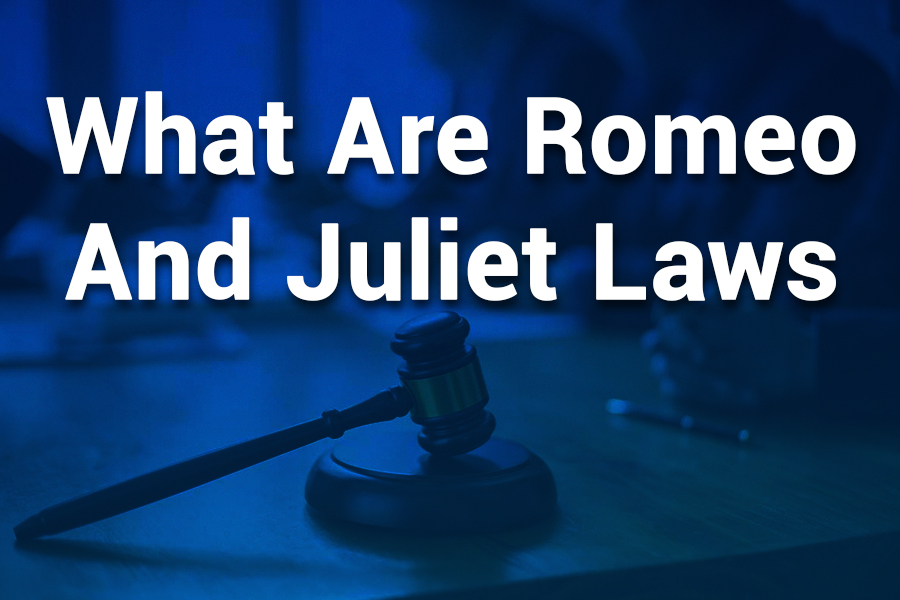When people hear the term “Romeo and Juliet laws”, it might sound like something straight out of Shakespeare. In reality, these laws have nothing to do with literature and everything to do with modern legal systems — specifically, how they handle certain consensual relationships between young people.
In this in-depth guide, we’ll explain what Romeo and Juliet laws are, why they exist, how they vary by state, and the legal and social implications of these laws.
Understanding Romeo and Juliet Laws
Romeo and Juliet laws are legal provisions designed to protect young people who engage in consensual sexual activity from facing severe criminal penalties if they are close in age.
Without these laws, a person just over the age of legal consent could face serious charges — including felony convictions and sex offender registration — for a consensual relationship with someone just under the legal age of consent.
Purpose:
- Prevent young people from being labeled as sex offenders in consensual relationships.
- Differentiate between predatory behavior and consensual teenage relationships.
- Reduce overly harsh penalties for age-appropriate relationships.
The Origin of the Term “Romeo and Juliet Laws”
The phrase comes from Shakespeare’s famous play Romeo and Juliet, in which two young lovers are separated by family conflict — not age. The legal term is a modern creation, but it symbolizes young relationships that are close in age but cross legal age of consent boundaries.
Age of Consent in the United States
The age of consent is the minimum age at which an individual is legally old enough to consent to sexual activity. This age varies from state to state, ranging between 16 and 18 years old.
Without Romeo and Juliet provisions, sexual activity between two people — even if both are teenagers — could result in statutory rape charges if one partner is under the legal age.
How Romeo and Juliet Laws Work
Romeo and Juliet laws don’t legalize sexual activity between minors; instead, they:
- Provide a “close-in-age” exemption for consensual relationships.
- Reduce charges from felonies to misdemeanors in certain cases.
- Prevent mandatory sex offender registration in eligible situations.
For example:
- If the age of consent is 16, and a 17-year-old and a 15-year-old engage in consensual activity, Romeo and Juliet laws may prevent the older teen from being prosecuted for statutory rape.
Key Points About Romeo and Juliet Laws
- They Vary by State – Not all states have these laws, and those that do may have different age gaps or rules.
- They Apply to Consensual Acts Only – Any coercion, force, or exploitation removes eligibility.
- They Often Don’t Apply to Large Age Gaps – Many states limit the age difference to 2–4 years.
- They Don’t Erase All Penalties – Some states still impose lesser penalties or require counseling.
Examples of Romeo and Juliet Laws by State
Texas:
- Age of consent: 17
- Close-in-age exemption: No more than a 3-year age difference between the younger and older partner.
Florida:
- Age of consent: 18
- Close-in-age exemption: Applies if the older partner is no more than 4 years older, and both are at least 14.
Ohio:
- Age of consent: 16
- Close-in-age exemption: Applies if the younger person is at least 13 and the age gap is less than 4 years.
California:
- No specific Romeo and Juliet law, but prosecutors have discretion in close-in-age cases.
Why These Laws Are Important
Without Romeo and Juliet laws, a consensual relationship between a 19-year-old and a 17-year-old could result in the older person facing:
- Felony charges
- Up to several years in prison
- Lifetime sex offender registration
These consequences can have long-lasting effects on education, employment, and personal life — even if there was no coercion or abuse.
Criticism of Romeo and Juliet Laws
While these laws aim to prevent overly harsh punishment, they also face criticism:
- Inconsistency: The laws vary widely by state, leading to unequal outcomes.
- Ambiguity: Some laws are unclear, leading to confusion about what’s legal.
- Perception of Leniency: Critics worry they may minimize the seriousness of underage sexual activity.
How to Know if Romeo and Juliet Laws Apply in Your State
If you or someone you know is facing charges related to a close-in-age relationship:
- Check State Laws – Visit your state’s legislative website.
- Consult a Lawyer – Laws are complex, and legal advice is essential.
- Understand the Details – Eligibility often depends on both ages, the age gap, and the nature of the relationship.
Frequently Asked Questions (FAQs)
1. Do Romeo and Juliet laws make underage sex legal?
No. They simply reduce or remove severe penalties in certain consensual, close-in-age situations.
2. Do all U.S. states have these laws?
No. Some states have no such provisions, meaning close-in-age relationships can still lead to prosecution.
3. Can someone still be charged under Romeo and Juliet laws?
Yes. These laws don’t guarantee immunity; they may just reduce charges or prevent sex offender registration.
4. Do these laws apply to same-sex couples?
In most states, yes — as long as the relationship meets all other eligibility requirements.
Conclusion
So, what are Romeo and Juliet laws?
They are legal protections for consensual, close-in-age relationships between young people, designed to prevent life-altering criminal penalties in situations that lack exploitation or coercion.
If you live in a state with these laws, they can make the difference between a life with a criminal record and one without. However, since these laws vary widely by state, it’s critical to research your local laws or consult with a criminal defense attorney.

